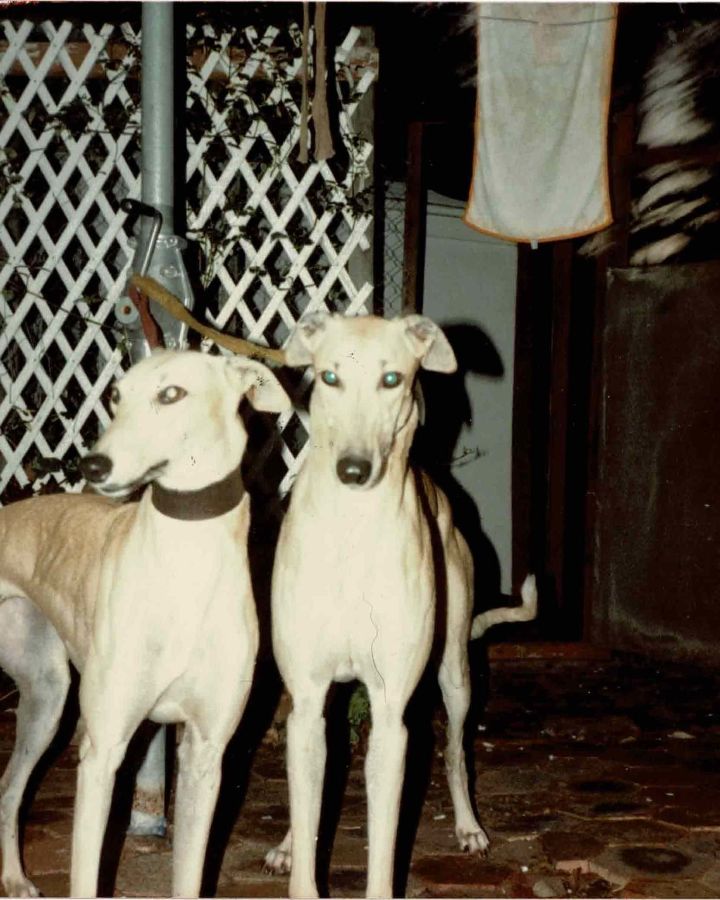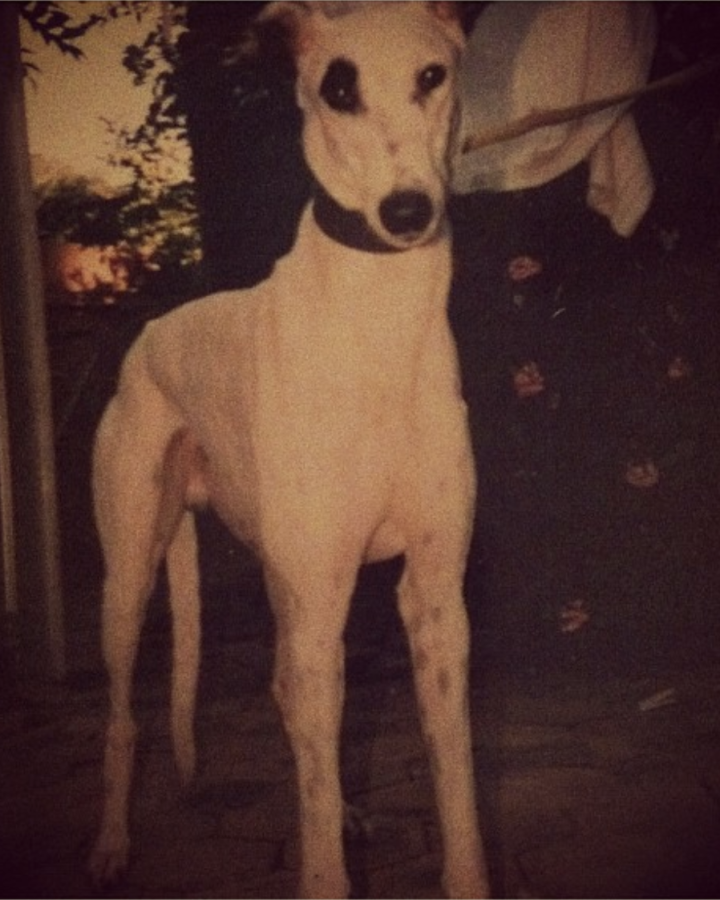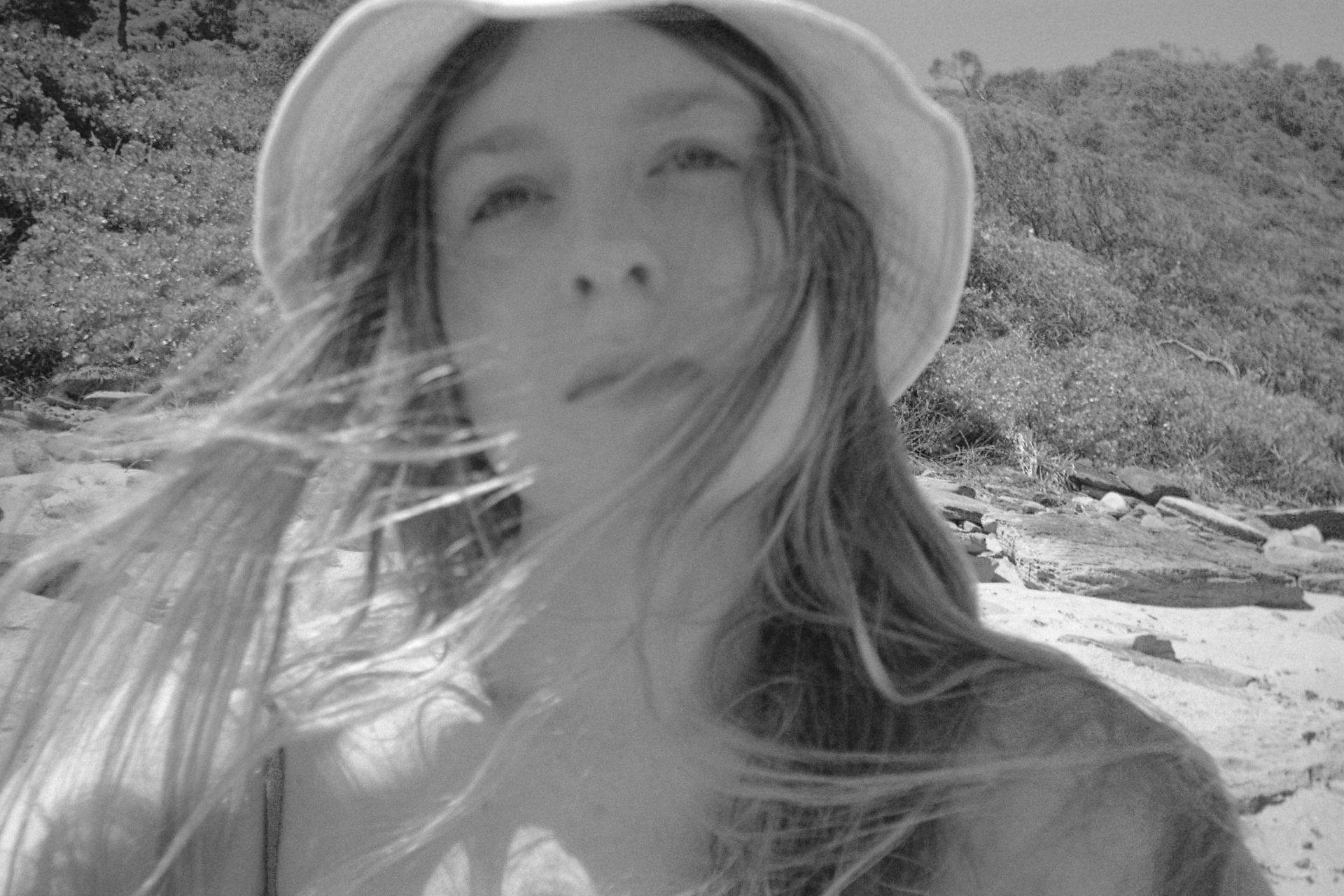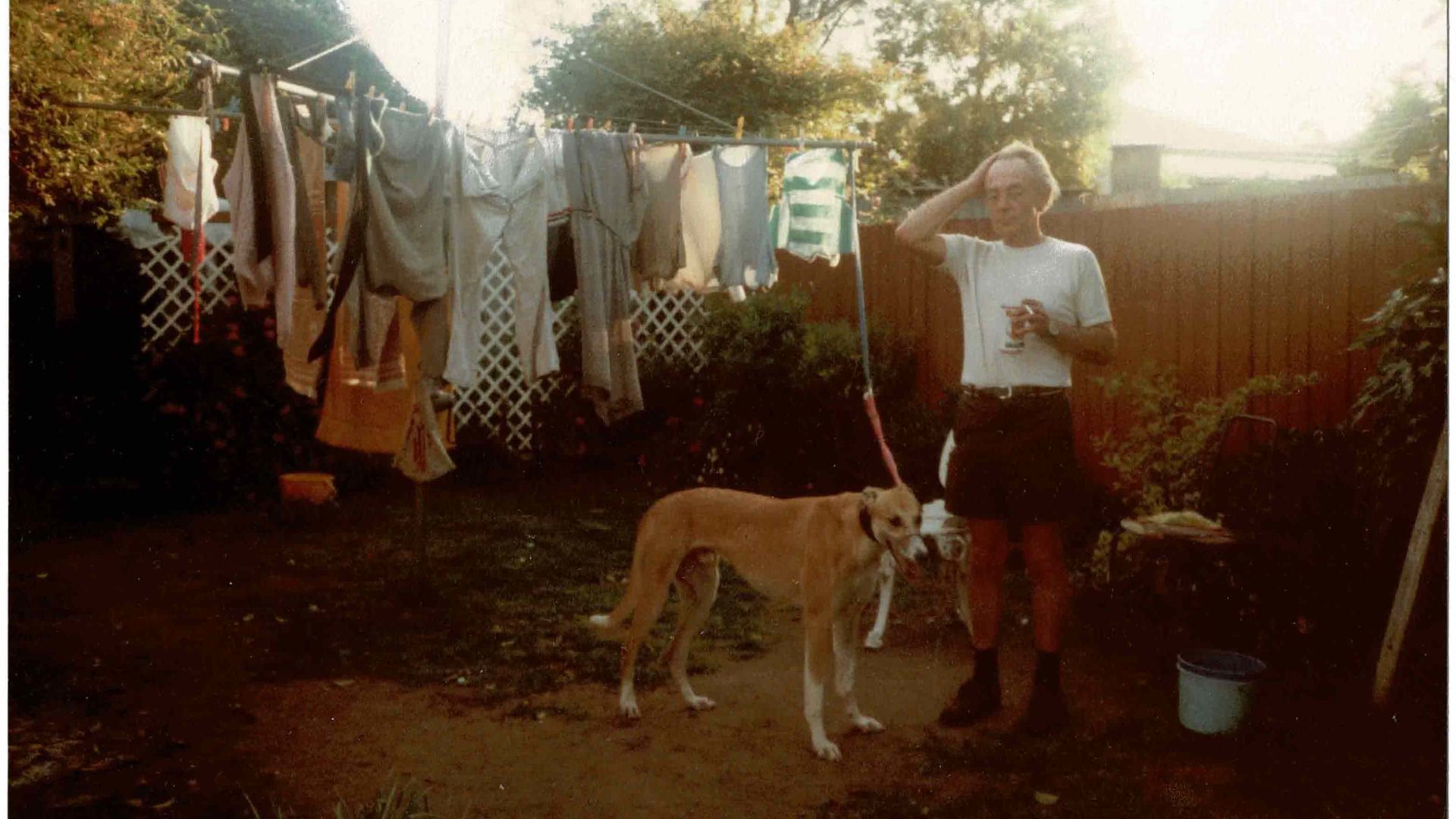"In this photo is Tiger and my grandfather. Fun fact: The image quality is old but Tiger is wearing a racing muzzle, which is the thing on his snout — a lot of people still put racing muzzles on their rescued greyhounds because they may be aggressive towards other dogs or small animals. It was also the law at one point that you can't walk a greyhound without a muzzle, I'm not sure if it is still is though!"
Andy chose this day on purpose. “I love horses, I have horses myself. As a kid, I used to watch the Cup and love it,” she says, laughing.
She recalled taking part in candy-incentivised sweepstakes for the Cup in primary school. “Nowadays, I don’t watch it. I haven’t watched it in years… it takes on a very different meaning to me now.”
Andy's short story, ‘Hunting Possums’, was selected to feature in Everything All At Once, an anthology of work by emerging writers, published by Ultimo Press. Her story is a haunting recount of duty, loss, memories and strained familial relationships. It follows the child of a professional greyhound racer and their attempt to reconcile two opposing sides of their identity.
Andy sat down with Vertigo editor, Erin, to speak about 'Hunting Possums' and her creative process.
EE: Please tell us a bit about your piece.
AK: ‘Hunting Possums’ is a short story about a person who is living in two worlds, struggling to know who they are and struggling to reconcile with their past. They are trying to chase the past while being hunted by it. They are unable to escape it.
EE: Greyhounds play a large role in this story. Do you own greyhounds yourself?
AK: Yes. About 10 years ago my mum brought home this big, black greyhound called Prince. When mum told me she was bringing home a dog, I was really excited because I love dogs. But she brought home this massive black hound and he was so scary to me. I was horrified. At the time we’d only had tiny dogs… [Prince] jumped and had big teeth; he was completely different to any other dog I'd ever known.
He was an ex-race dog. The owner was getting rid of him so mum found the ad and brought him in. I realised from having Prince was that greyhounds, especially racing greyhounds, are very different types of dogs. He was very robotic and didn't really understand affection. He never wagged his tail. The only time he wagged his tail was to hunt and chase things. He didn't really have a personality at all. Especially compared to our Jack Russell who had tons of personality...
I remember we were walking [Prince] on the beach one time, not knowing, and a massive poodle came up to say hello and Prince just launched onto the poodle and bit his ear.
We were horrified and didn’t know what to do. We’d never had a dog that would attack another dog. Luckily the poodle was fine and so was Prince, but we realised… this isn't the same. We're dealing with something that's completely different to what we've ever dealt with before.
After that, we never really trusted him with other dogs. He always wanted to hunt things. We couldn’t trust him with cats. He had to be kept separate from the other animals. But that didn’t deter my mum, she loved him. When she was a kid, my grandfather used to have racing greyhounds... That was back in the early 90s. It was very Australiana, he had them in his backyard. My mum just had a love for these animals, so we ended up accumulating all these greyhounds. I have eight at the moment.

Sasha and Mandy, two fawn greyhounds from the early 90's

Pirate ("Obviously named for his black-eye patch.")
EE: I had never read a story about greyhound racing from this perspective before…
AK: This is the thing — greyhound racing is extremely polarising, like any sport of animals... like horse racing. But I think greyhound racing is even more so because it's about dogs. People seem to have a deeper relationship with dogs than horses. More people have dogs so they can relate better.
As someone who has both of them, horse racing is the same, if not worse in some circumstances. What people don't understand is that when we’re rescuing these greyhounds, we're not getting them from the pound. We're not getting them from greyhound rescues. We're getting them from actual trainers, or owners. They've done their racing and they're trying to rehome the animal.
It's not that they want to necessarily rehome the animal. They may really like their dogs but they don't have room because, to them, that's business. That's how they make their money and how they make their living.
It might be better if that wasn’t the case at all and we didn’t have greyhound racing altogether, but then all those people will have to find other careers and other jobs. There’s really no great answer.
EE: I think that’s why I loved your piece so much because you weren’t making a moral judgement on your characters. You left it up to the reader to interpret.
AK: Yeah, it's up to you to make that decision. I’ve never been the kind of person to take sides. I've always been very neutral. Also, studying law, I’ve always been a very neutral person.
A lot of people in greyhound racing come from really challenging backgrounds. They feed their dogs over themselves because their dogs have to be healthy in order to run, win and make money.
My intention wasn’t really to make a judgement on greyhound racing. It’s more that I was inspired to write it because I know a bit about the industry. I think there's such hatred, especially from our generation, towards things like this. But we can't really understand it. I didn't want to bring hatred towards it. I just wanted to question it…
Sometimes I go to friends’ houses and I'm like, ‘Why is your dog locked up all day and you don't even walk it?...’ How can you put something onto other people that you are kind of guilty of? You're not the perfect animal owner yourself… But then at the same time, I also don’t agree with [racing]. I don’t know… I’m neutral.
EE: So many small details stood out to me in your writing, like the plating of lobsters dancing and floodlights on the sand. It’s all so detailed and specific. How much of this is autobiographical and how much is pure fiction?
AK: The names of the dogs are real. Pearl was a dog my mum owned when she was 20, she was her favourite dog. Bobby was also real and he did kill a cat, but there was no burial — that was my inner writer coming out.
The plating scene was inspired by my grandfather because he used to be a banquet chef in the navy. He used to tell stories to me about how he would plate lobster like it was dancing for weddings. I was inspired by that because I'm also vegetarian. There's vegetarianism in the piece too. I find that interesting because these are also animals. Especially with banquets, a lot of it is wasted. You’re killing these animals and then putting them up like a sculpture… you’re not even eating them. What is that? Art? So yes, there are a few things in there that are real or are inspired by life or my mum or granddad's life.
EE: Was this a story you’ve wanted to write for a while or did it come out of urgency with what has been going on in NSW with greyhound racing in the past few years?
AK: I actually wrote this about three years ago but it was a completely different story. The first paragraph — ‘I have long dogs in my yard’ — that’s the same, but I never really liked it as it was. I fully rewrote it last year. I thought no one had really written about greyhounds or greyhound racing. But the story isn't entirely about that, it’s more about the relationship between the protagonist and their mother.
I love writing about little moments, vignettes and memories. I write about memories all the time. My life is full of memories — I’m haunted by the past.
A lot of people are future-looking and live in the moment but I’m not. When I’m lying in bed, I'm always thinking about what happened yesterday, two years ago or 10 years ago.
I wanted to write something more personal and knew I could because I have all of the memories myself and all of that experience with dogs. I find it interesting when I read a story about something I don’t know about, and I know that other people don’t know about greyhounds. Whenever I tell people that greyhounds aren’t the same as other dogs, they don’t understand. I have eight of them... I know what it feels like to be holding a greyhound that wants to kill something or wants to chase after another dog. Your whole life changes a little bit because you can't walk this dog on a beach. You can't walk it in the park. You're always on alert and you're always kind of scared because you don’t want a dog to come up and get hurt. You also don’t want your dog to get hurt.
You never really look at dogs the same way again. You also look at people very differently too. I used to think people walking their dogs off a lead was fine. Now, I know you shouldn't. It’s fully changed how I am as a person, just from owning these animals. I’ve learned things I never thought I would learn.
EE: Does studying law impact your writing and creative process?
AK: I’ve always told everybody that law is my backup degree. I think law is interesting because you are always looking at different sides of a story. To me, being in a courtroom is all about hearing stories. You’re getting stories from people who are guilty, people who are not guilty; everyone has a story — that’s what law is about. But, it’s not just black and white. Learning law has made me more of a thinker and has encouraged me to look beyond the surface and see what’s deeper.
I think creative writing and law are actually complementary. A lot of people think it’s a strange combination but I don't think so. They are both about stories. It’s just the way you narrate and write is different but you have the same objective in the end.
EE: How are you feeling about being published in this emerging writers anthology?
AK: I’m really honoured. I was actually surprised I got selected because I forgot about the deadline and I actually submitted it on the day it was due and I haven’t submitted this story anywhere else… I’m glad it was selected because this story is really close to my heart. It has a lot of me in it and a lot of my family history. While it’s not completely autobiographical… it’s not a story about my family per se but I’m really glad it got chosen. I hope it lives up to what the other stories are and that people enjoy reading it and at least get something out of it. That’s what I wanted. It’s an Aussie story that’s a bit different.

Andy Kovacic, author of 'Hunting Possums'
You can read Andy's short story, 'Hunting Possums', in Everything, All At Once.
A vibrant and essential collection that celebrates the future of Australian writing, Everything, All At Once showcases showcases 30 emerging writers under 30 as the winners of the inaugural Ultimo Prize. Brimming with a host of intriguing characters seeking comfort and connection in an uncertain world, this collection of short fction and poetry sets the agenda for the next generation of Australian writing.
Images provided by Andy Kovacic.


 -
-